#i love old men and their war veteran energies without the war crimes
Explore tagged Tumblr posts
Text


Lugh
A master and mentor whose path of life led him to a more open teaching style. As a young man, he was known to be an enthusiastic but goofy student, now grizzled by a haunted past and an uncertain future.
#sham's art#shamsbabs#lugh#i'm caving in to my instincts and making a whole class just for him#so he's not directly mishmashed into khdr's story#but he's there as an adjacent presence y'see#more on that later but rn?#i love old men and their war veteran energies without the war crimes#or at least some fictional war crimes idk#one day i'll do more with him for now i dedicate an unholy amount of attention to everyone#kh oc#kingdom hearts oc#khdr oc
6 notes
·
View notes
Note
I LOVE your crocodad theory I'm an obsessed believer but did u ever get romantic vibes from crocodile & robin business relationship? Many people get lover vibes from them & I never understood why. They seem VERY strictly business/stab each other in the back relationship. (Plus crocodile is TERRIFYING).
I think Croco/Robin as a ship exists kind of like... out of circumstance? Kind of?
Quick disclaimer, I only got into OP in like 2008~ish at the age of 13, I can not comment what it as like being in the fandom before that because I wasn't there (and when OP began in 1997 I was like two whole years old). So whatever I say here doesn't come from like, a fandom veteran who knows the entire history of the OP fandom or anything. I'm just attempting to rub my braincells together here
Like in the year of our lord 2023 we have many wonderful Crocodile ships to classify as OTPs and NOTPs etc, but if we go back to like 2006 or so, long before the Summit War Saga was even a thing, try to think about what characters you would have shipped Crocodile with? Because for a long time, the only canon material Crocodile had appeared in was just the Alabasta Saga (+one brief cover story), and we don't really see Crocodile interact with that many characters during the story. Like. Really the only character Crocodile has multiple, extended interactions with aside from Luffy and Vivi is Robin. All the other characters he interacts with maybe once or twice for very brief scenes, so based on canon material alone, there isn't much for fuel for shipping purposes.
It really wasn't until Marineford when we finally started getting other characters to ship with Crocodile, mainly the Ever Loyal Daz who seems to be willing to follow Crocodile anywhere (romantic as fuck) and Doflamingo after he and Croc tried to kill each other twice at Marineford (people seem to love a tsundere Croc) And now with Cross Guild we also have Mihawk (and Buggy) as far as shipping options go. And of course there's MORE than just these ships, there's the more crack-leaning ships (like Dragodile and whatever you'd call the Cobra-ship) and some others (Jinbei, Whitebeard, Ivankov, Galdino, Luffy even) etc etc
The only difference is that Croco/Robin got to kind of be like, "the default Crocodile ship" for like 8 years without major competition. And because the ship has "history", even when new ships pop up the one that has been around the longest will still stick out. Not to mention, although we have options now, even those have very little canon material to actually work with when compared to Croco/Robin. Like Dofuwani exists because the two had like three whole pages worth of interactions, but compare that to the screentime Croc had with Robin? It's not even a competition
Not to mention, Croco/Robin is just. Like it's kind of the mandatory het ship. Like there aren't many straight options with canon material to work with, and there's gonna be people who really want to have a het ship with Crocodile if you know what I mean. But also, let's be real. There's a lot of straight women who're horny for Crocodile. Valid as fuck. And Croco/Robin could have like, a self-insert-y quality to it, like some people might be able to see themselves in Robin? Also valid. And that can apply to some straight men too, like I'm sure there's cishet men who look at Crocodile with that "god I wish that were me" energy, who love seeing Crocodile ship fanart with Robin, as they can project onto Crocodile etc. This is also valid. Point is that the ship appeals to cishets by simply being a het ship, but also it might make for an easy ship for a lot of straight people to project onto for one reason or another.
But to be fair, I'd be lying if I didn't admit that I think Croco/Robin has the potential to be a really interesting ship. Like they ARE the Baroque Works Boss Pair, literal partners in crime, the most powerful members of the secret criminal organization who run the whole operation, they worked together by themselves for four whole years, Crocodile protecting Robin by allowing her to hide under his wings. They were together, ready to take over an entire country and obtain a weapon of mass destruction And then Robin betrays him. And Crocodile admits he never trusted her to begin with.
Like on paper alone, this is great material for a juicy romance.
Especially now when we understand why Robin was on the run and why she feared being betrayed, and how looking back at Crocodile's reaction when Robin "reads" the Poneglyph for him, he genuinely seems a little sad about her betraying him (mystery trauma etc). This is a genuinely interesting character dynamic, like even without any romantic context I would love to see Crocodile and Robin meet again in the storyline and like, see what Crocodile thinks of Robin having joined the Strawhats vs what Robin thinks about Cross Guild, how the two might interact etc. They are interesting to me
Like personally, I agree, I don't think the two were actually ever romantically involved with each other (frankly I don't think Crocodile trusts anyone anymore enough to let them get close him like that, dude's been voluntarily celibate for like two decades lmao), their relationship was surely just business-only. And while the ship doesn't personally interest me (just kinda "meh" for me), I do understand why the ship appeals to others and why it's popular to this day
But yeah, I do think a lot of the reasons Croco/Robin is as popular as it is due to circumstance. It's been around the longest, it still arguably has the most canon material to work with, it appeals to lots of people. God knows shippers don't actually need the characters to like each other, otherwise people wouldn't be shipping Croc with Buggy as we speak
#Moon posting#OP Meta#Sir Crocodile#Nico Robin#Long post#I feel like I should tag this with the shipname because this IS about the ship but while it's not explicitly negative don't wanna bother pp#I don't know how this turned into a psuedo fandom history lesson (based on vibes alone and no actual facts) I am so sorry man#My brain just started running and I had to release the worms#Sometimes a ship that's just big scary powerful murder man and small murder woman makes brain go brrr#The appeal is not lost on me#(Personally I've just become an absolute sucker for CrocHawk. I am so invested in these two. Oda I need to see them more together)
24 notes
·
View notes
Link
Full article below.
Max Minghella is sitting in his backyard in the LA sunshine, his t-shirt an homage to the French filmmaker Mia Hansen-Løve, his adopted shepherd mix, Rhye, excited by the approach of a package courier.
“You okay, sweetheart?” he asks — the dog, not me — tenderly.
Minghella, who at 35 has dozens of screen credits to his name, is best known as The Handmaid’s Tale’s cunning chauffeur Nick Blaine, a character who it’s difficult to imagine saying sweetheart. In airless Gilead, of course, a cautious hand graze with Elisabeth Moss’ June can pass for a big romantic gesture. In a Season 1 episode featuring child separation and hospital infant abduction, Nick’s major contribution is to trade stolen glances with a sex slave while “Don’t You (Forget About Me)” pumps discordantly along. I ask Minghella about playing the series’ closest approximation to a dreamy male lead against the show’s dark narrative of female subjugation.
“I know this is not the answer you want to hear,” Minghella says with none of Nick’s hesitation. “But I like that stuff, right? In the pilot, I think Nick only had a handful of lines. It wasn't clear that this is what the character would turn into. And it's quite fortunate for me personally, because I'm not a massively sort of intellectual person in my real life. I love Fifty Shades of Grey. That's like my Star Wars. It suits me to play a character like him.”
Minghella surmises that this enduring romanticism is an outcome of nurture. His father, the late British director Anthony Minghella, made grand romantic dramas like Cold Mountain and The English Patient. And there was the young, cinema-mad Max sitting on the living room sofa, absorbing everything. “It’s taken me a long time to understand this,” he says of his prolonged childhood exposure to love stories. “My dad made The English Patient when I was 10. So it was two years of watching the dailies to that movie and then watching 50 cuts of it. And then [The Talented Mr.] Ripley he made when I was 13, and it was the same thing.” These were an adolescent Max Minghella’s alternative to reruns. “I think they did shape my perspective on the world in a lot of ways, specifically The English Patient. That was a complicated love story, and I wonder sometimes how much it's affected my psychology.”
Some sons rebel; others resemble. Minghella’s co-star O-T Fagbenle, who plays June’s other lover from before the time of Gilead, got his first job acting in Anthony Minghella’s romantic crime film Breaking and Entering. “Anthony is one the kindest, most beautiful men that I've ever had the privilege of working with before,” Fagbenle says. “And Max has his gorgeous, sensitive, open-minded soul.”
Though Minghella spent his childhood on the set of The Talented Mr. Ripley, playing an uncredited Confederate soldier role in Cold Mountain, and tooling around with a Super-8 camera Matt Damon gave him, he insists his upbringing was normal. He grew up in South Hill Park overlooking Hampstead Heath in London with his father and mother, the choreographer Carolyn Choa. (Minghella also has a half-sister, Hannah Minghella, who is now a film executive.) Yes, technically, it was London, but that’s not how it seemed. “I feel like I grew up in a very small town. Every school I went to was in Hampstead. I was born in Hampstead,” Minghella says of the small map dot of his life before university. “When I went to New York, I felt I was going to the big city.”
Despite his illustrious surname, movie-watching was far from restricted to the classics. “Beverly Hills Cop is definitely the movie I remember having an unhealthy obsession with. I think I saw it when I was 5 for the first time, and I'd watch it just two or three times a day for years. I'm just obsessed with it.”
Plenty of actors can trace their love of movies back to a love of stories, but for Minghella the relationship seems to flow in reverse. When he left for Columbia University, Minghella opted to study history for its connection, through storytelling, to film. It was during the summers between his years of college that he started taking acting more seriously. Before his graduation, he’d already appeared in Syriana, starring Damon and George Clooney. Soon, he’d make a splash as Divya Narendra in The Social Network in 2010 and be cast in Clooney’s Ides of March. As all young actors eventually must, Minghella moved to Los Angeles.
It’s been over a decade since he last lived on the Heath, but, perhaps unusually for a person who’s chosen his profession, Minghella is adamantly not a “shapeshifter,” in his words. Home for Christmas this year, he started sifting through old journals stored at his mother’s house, “just like scraps of writing from when I was extremely young up through my teenage years,” before coming to America. “It was hilarious to me,” Minghella says of staring at his childhood reflection. “My review of a movie at 7 years old is pretty much what my review of a movie at 35 will be. My taste hasn't changed much. And when I sort of love something, I do tend to continue to love it.”
Which brings us back to his enduring love of romance, born of his bloodline, which is all over Minghella’s own 2018 directorial debut. Teen Spirit is a hazily lit film about a teenage girl from the Isle of Wight — the remote British island where Max’s father Anthony was born — who enters a local X-Factor-style singing competition. (It stars Minghella’s rumored girlfriend of several years, Elle Fanning.) The story is small, but its crescendos are epic.
Minghella calls the movie — an ode to the power of the pop anthem — “embarrassingly Max.” Max loves a good music-driven movie trailer — he’s watched the one for Top Gun: Maverick “many” times. And Max loves the rhythmic beats of sports movies like Friday Night Lights. Max loves movies with excesses of female energy, like Spring Breakers. He likens Teen Spirit to an experiment, his answer to the question, “Can I take all these things that I love and find a structure that can hold them?” The result is a touching “hodgepodge” of Minghella’s fascinations, inspired by the songs from another thing he loves: Robyn’s 2010 album Body Talk (itself a dance-pop meditation on love).
Minghella hasn’t directed any films since, but he sees now how making movies fits his personality — organized, impatient — more organically than starring in them does. Directing also helped him to appreciate that acting is “much harder than I was giving it credit for,” which, in turn, has made him like it more. Besides The Handmaid’s Tale currently airing on Hulu, Minghella appears in Spiral, the ninth installment in the Saw horror franchise and, from where I’m sitting, at least, a departure.
“I do like horror movies, but the thing that was really kind of magical is that I was feeling so nostalgic, right? We talked about Beverly Hills Cop earlier. I was just missing a certain kind of movie,” Minghella explains of his new role as Chris Rock’s detective partner. He was yearning for simple story-telling, like in the buddy cop movies of his youth, especially 48 Hours. It almost goes without saying that a buddy cop movie is another kind of love story. “And then I read the script and it was very much in that vein.” He clarifies: “I mean, it's also extremely Saw. It's very much a horror movie.”
His renewed excitement for acting translated onto The Handmaid’s Tale set, too. Veteran Hollywood producer Warren Littlefield describes casting Minghella in the role of Nick as an effortless choice: “Sometimes you agonize over things. [Casting Minghella] was instantly clear to me, and everyone agreed.” Now in its fourth season, the tone of the Hulu hit is graver than ever. Gilead is more desperate to maintain its rule, and so more audacious in its violence. Perhaps it’s fitting that the show’s romantic gestures finally match that scale.
In one particularly soaring moment, Elisabeth Moss’ June and Minghella’s Nick meet at the center of a bridge and crush into a long kiss. It’s been two seasons since they held their newborn daughter together, and it’s hard to see how this isn’t their last goodbye. Littlefield, like Minghella, is here for the romance among the rubble. “It's spectacular when they come together. In the middle of all of the trauma is this epic love story,” he says. “Max is just magnificent in the role.”
For Minghella, the satisfaction is more personal. He works with good people, he likes his scenes, and he thinks Nick is a complex character. Minghella read The Handmaid’s Tale for the first time in college in 2005. Like all the things Minghella has ever liked, he still likes it. He’s as proud of this most recent season as he is the show’s first. And he watched Nick and June race recklessly back to each other across the expanse of the screen exactly how you might expect. “I watched it like a fan girl.”
#max minghella#the handmaids tale#the handmaid's tale#nick blaine#nick x june#june x nick#osblaine#*
88 notes
·
View notes
Text
mulan (2020) and chi, a mystical misrepresentation
Disney’s research on chi (气) suggests that early on they fang qi (放弃). Mulan live action makes me want to fang pi (放屁). Long explanation on my gripes with this cultural 'representation’ which ends up backfiring into making Chinese culture look bad, plus why including the ~exotic Asian mysticism~ of qi ruins Mulan (2020).
*Translations of the words below cut
Part 1: Crouching Representation, Hidden Insult
Firstly, the accepted pinyin is qi, so I have no idea why they’re using chi. I’m no expert on Chinese medicine or spirituality, but I did grow up watching wuxia and having a mother who insisted I change my diet to balance the heat/cold/dry. The concept of qi is not a mystical one to me. I associate it with action movies and aunties who believe in alternative medicine – superstitious, but in that familiar, domestic way. Part of my tradition. Part of my culture. Part of my life.
Qi is not a magical outside force. Qi is your own personal energy. In stories, while you can seal other people’s qi or damage it, it’s not like some life force in nature where you can tap into a flower’s qi to gain plant powers. Mastery of qi is akin to an Olympic athlete who hones their body and self-control to peak physical performance. While their abilities may seem superhuman, they are not divine or innately magical.
In a wuxia setting, people can train until they get enhanced reflexes, strength, senses, motor skills and possibly healing abilities. These are all ‘normal’ human abilities that have simply been pushed to unrealistic levels. Even walking/running on water, running up vertical slopes and ‘flying’ can be explained as being really fast or…jumping really, really far. Outrageous? Yes. But importantly, not magical. This is why a wuxia hero can still be freaked out by the supernatural. In a wuxia setting, using qi is normal and anyone can become the strongest qi user. Some use it for fighting, others to be doctors (enhanced senses + acupressure), or solve crime (there’s quite a few wuxia detective stories out there).
In xianxia, there are more fantasy elements. Those who hone qi are usually cultivators, who do so with the end goal of becoming immortal. This is not a unique trait; the setting often has several (sometimes even hundreds) of flying, super strong, immortal people who have some degree of fame. There can even be establishments that teach cultivation. Or multiple sects full of cultivators who have honed their skills in qi. Entire armies of people who can cast spells and telepathically control their sword. One could argue that immortality is just the mundane ability to remain healthy pushed to the extreme, but xianxia is where monsters and demons and gods roam about.
There are further differences between the genre, but I only want to point out their similarities concerning the concept of qi.
Everyone is born with qi. Nobody is born with the skills to utilise their qi. Qi must be honed through training, usually in a balanced manner (both physical strength and mental acuity, along with some spiritual growth). Even heroes who have parents with strong qi start off weak, because if you can’t use you qi then you’re just a normal person, because everyone has qi. Being born with unusually long legs and large lung capacity might make you a good sprinter, but you won’t go to the Olympics without training, even if both your parents are gold medallists. It takes self-discipline, a good coach and a mastery of your body to reach that potential.
This is one of my gripes against Disney’s idea of ‘chi’ in Mulan. The other one is-
Qi is not gender restricted. In fact, feminine qi is associated with yin, the black part of the yinyang symbol. Not a new concept. There have been female martial artists and heroes in Chinese works for a long time. I hate how Disney is taking a gender-neutral concept, one which already has a degree of progressiveness in Chinese culture and deciding that “chi is not for women” just to push their girl power moral. For a long time, wuxia has had women warriors. Women MASTERS. Yeah, not every kung fu master is an old man with a long white beard. There are female-only sects. There are badass female warriors who participate in hand-to-hand combat and rack up kills. They’re not regulated to being healers and archers and that one ‘Amazon warrior princess’ using a whip. Growing up, I saw more strong, heroic female warriors in Chinese media than Western when I watched action films.
This is my main problem with Disney’s horrendous cultural appropriation. Instead of properly representing the culture, instead of doing research, instead of just NOT GOING FOR EXOTIC ASIAN MYSTICISM, they actually make Chinese culture look worse than it is. To. Support. Feminism.
Part 2: The Chi-asy Way Out
In addition to butchering the core concept of the thing they’re appropriating, Mulan (2020)’s baffling inclusion of qi, whoops, chi makes the story worse overall. Mulan being born with strong chi makes her a master warrior from childhood. However, society doesn’t like it when women have chi, so she is shunned and her parents worry for her. As a soldier, though, chi powers make her an asset to the army, so she becomes respected. In the end she is a hero.
Oh, and remember when Disney said removing Mushu was because they wanted a more accurate adaptation of the original poem?
MULAN WAS A NORMAL PERSON AND NEVER FOUGHT ANY BIRD WITCHES.
The problem is that this means nothing Mulan accomplishes is due to her own actions. How is this an uplifting feminist story? This is the message: “If you’re a girl who fails to conform, you will be ostracized. Don’t worry though – so long as you’re born super special and strong, make the right heroic choices and use your strength for good, you will find acceptance!”
WHO. IS. THIS. EMPOWERING.
Isn’t this just another ‘not like other girls’ story? Mulan likes something that only boys are allowed to do, so men don’t like her, until she proves she’s better than them at that thing, so they accept her? That’s not feminism! Women don’t need to prove anything to be allowed to pursue their passions or feel proud of their identity. And they don’t need to be the best at something to be allowed to do it!
In Mulan (1998), she lacks the raw physical strength of the men. This actually makes sense – she’s the daughter of a wealthy family (hence the marriage arrangement, the nice estate) – so she’s weaker. This weakness leads to her getting bullied. Mulan realises she can’t succeed if she tries to match them in brute strength. She then uses her brains to succeed. There’s a brief training montage where she becomes stronger which admittedly doesn’t explain why she suddenly gets swole, but it’s reasonable that she was always capable to being as strong as the men and merely lacked their background of physical labour (even Po, as monks are expected to maintain their temple).
In Mulan (2020), she just stops hiding her superpowers. After a personal pep talk from her commander, which she gets…because he knew her war veteran father.
Ah yes, magic and nepotism, the inspiration that little girls need! Feminism!
It gets worse. Mulan’s chi not only allows her to excel in the army, but it leads to the main villainess/anti-villain to fixate on her. Xian is a witch, a woman who used chi but fell to darkness. Her goal is to make a world where, uh, women born with strong chi aren’t oppressed. She immediately recognises Mulan as a woman with chi and inexplicably gives her chi tips while in battle. She then repeatedly leads Mulan to each plot point, culminating in her sacrificing herself to save Mulan because she sees Mulan as the kind of person she wanted to be, but couldn’t due to oppression.
Chi is the reason why Mulan is a hero. Chi is how Mulan arrived on time to save the Emperor. Chi is why she is respected. Chi makes her special. Chi makes her a hero.
The addition of chi takes away so much of Mulan’s character growth, her struggles and subsequently her triumphs. Did she join the army for her father’s sake, or because she knew her only chance to succeed was on the battlefield, where chi is a powerful weapon? Is the emperor offering her a position on his staff out of respect for her abilities, or fear that shunning her will turn her into another Xian (who almost singlehandedly gave Bori Khan victory and ALSO was responsible for foiling his plans because her abuse led to her betrayal)? Even the love interest doesn’t befriend Mulan until she shows off her chi and beats him in combat.
Chi gave Mulan everything. And with this poor addition of ‘chi’, Disney took everything from Mulan.
气 - qi, ‘air’ 放弃 - give up 放屁 - fart
#mulan#mulan 2020#mulan film 2020#mulan live action#disney#fuck off the west already thinks china is backwards and needs enlightenment#mulan rant
118 notes
·
View notes
Text
properly introducing my main fanservants!!!
LOTS OF PHOTOS/ART AND SUCH UNDER THE CUT BUT LIKE,,,, THIS IS JUST. A QUICK INTRODUCTION. TO MY PRIMARY SERVANT BASTARD CHILDREN- (in order of appearance; Sebastian Moran, John Watson, Enola Holmes, Columbia, Thomas Edison (True), Nicolas Flamel, Captain Stormalong, Edgar Allan Poe)
Feel free to hop in my ask box if you wanna talk about them or have any questions!!! Thank you for reading ily-
Colonel Sebastian Moran (Assassin)
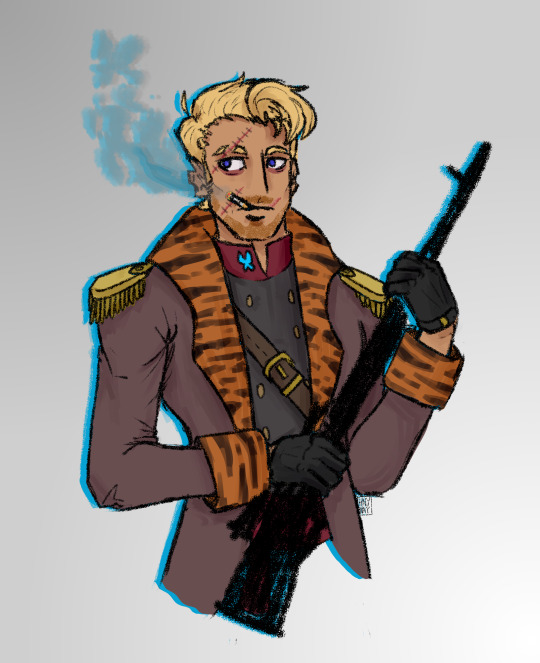
My primary servant OC by far! Professor James Moriarty’s chief-of-staff and right hand man- the second most dangerous man in London, after the Napoleon of Crime himself. Nicknamed ‘Basher’ or ‘Tiger Jack’, among others..
Moran is- or was- the most skilled marksman in the British Army, before he was dishonorably discharged. There are only a handful of men on the face of the continent able to shoot as well as he. As well as being an unnaturally skilled shot, he is a devoted sportsman and big-game hunter, and has notoriously tangled with tigers by himself in India- a predator that rather aptly describes the man himself. He authored two books, and his feats are still legendary in India, where his record 'bag of tigers' still goes unmatched. Although his outwards appearance was that of a respectable London gentleman and honorable military veteran, he gained a reputation in the evil underworld and was recruited by James Moriarty, serving as his 'chief of staff' of his criminal empire as well as his personal assassin for jobs that required his peculiar skill with a rifle.
The man is, as one Chaldean staff member puts it, a 'stone-cold badass'. He has a nerve of iron, and is vehemently loyal to both Professor Moriarty and his Master. He lives for danger, and the thrill that comes with 'kill or be killed' situations. Moran is also extremely easy and obvious to read- smiling 'like an idiot' when happy, and 'frowning like thunder' when angry. He does rather enjoy killing people, and is overall a man of few morals (although still having more than the Professor)- which, paired together, is what led to his leave from the military as he's practically a walking example of the 'Colonel Kilgore' trope. The more challenging the kill, the more enjoyment he gets out of it. As a strange upside, Moran has no illusions of how he's a right bastard.
"Ask anyone who knew me in the army, and you'll hear the same things about Basher: tiger in the field, bounder in the mess; a good man to have your back, but a bad man to show your back to; trust him with a fight, but not your sister, your wallet, or a deck of cards."
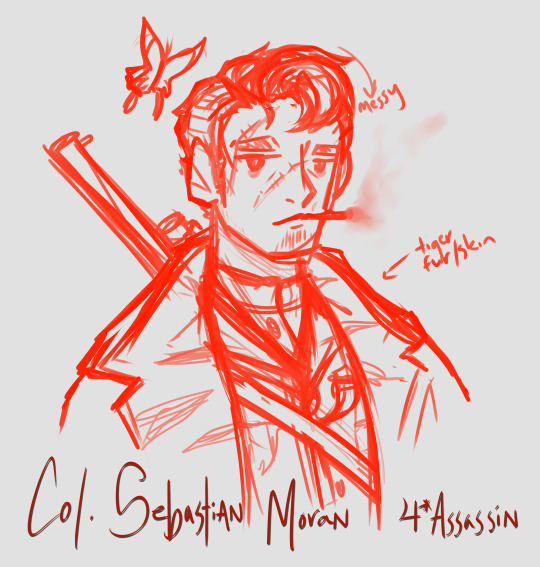
His Noble Phantasm, which represents his unmatched skill with a rifle, is called BEBR DER KHANH KHALI - Persian for ‘the tiger in the empty house’.
The bullet shot is, unlike others, a specially-made expanding revolver bullet which makes Moran unable to be likely linked to the kill. Much like a ghost or a tiger stalking its prey, he is completely silent in his attack, and the target can never see him coming before they're already dead- and just as quickly he is gone, seemingly disappearing into thin air without a trace.
No matter the conditions or distance, as long as Moran can see his target in some way- whether by the naked eye or through his scope, or perhaps in some other manner- his shot is guaranteed to hit its mark with deadly accuracy.
Also, if you find him not wearing his coat, it’s probably because he gave it to Jack. He loves knife child. They deserve proper clothes.
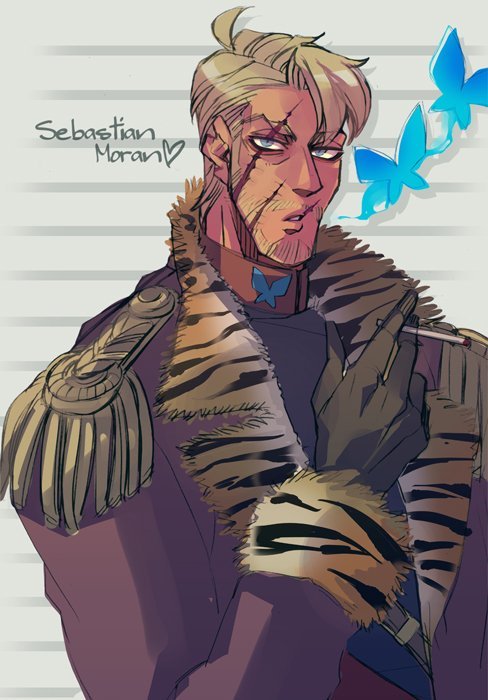
(source: amon-sheep on twitter)
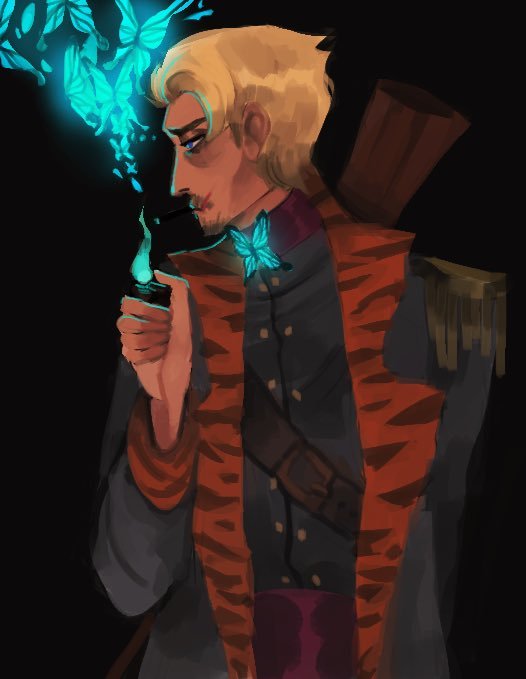
(source: manalmmune on twitter)
[[LINK TO HIS CHAPTER IN MY FANSERVANT FIC]]
--
Doctor John Watson (Caster)
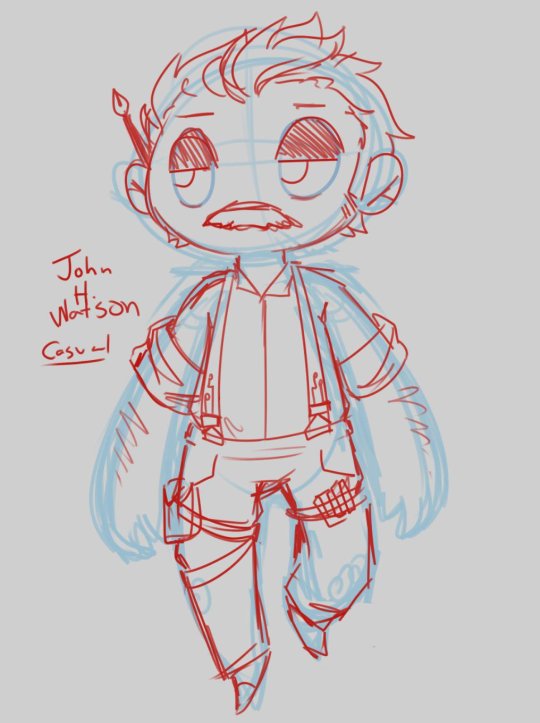
The famed Boswell and best friend of the great detective himself. Aman who is most like his traditional origin, as opposed to the heavyset comedic figure modern media tends to make him out to be- aka the Watson that is described by Doyle as a former rugby player, an army man, and popular among the fairer sex due to his handsomeness, intelligence, and charm.
He quickly becomes a proper ‘fatherly’ figure in Chaldea and especially to Master, due to his big dad energies, despite never having the chance to be a father in his life. Chaldea also appreciates finally having a proper doctor that isn’t a Berserker or... whatever’s going on with Ascelpius. Watson is Holmes’s life compass, the loyal companion always by his side who balances the detective out.
Although he’s a caster, he also wields his trusty wartime revolver, and is curious in that, unlike most casters, he has one offensive Noble Phantasm- it’s his secondary, and his primary ‘Conductor of Light’ crystallizes Watson's role as a 'whetstone' for Sherlock Holmes's mind and unmatched stimulator of his famous flatmate's genius. As Holmes himself summarizes, “It may be that you are not yourself luminous, but that you are a conductor of light. Some people without possessing genius have a remarkable power of stimulating it.” This Noble Phantasm is purely supportive, serving to bring out the absolute best in an ally- whether it be manifested in power, magic, or inspiration- and temporarily unlocking a vast wealth of potential that they might not have even known they had. The exact limitations or bounds of it is not known, as it can seemingly extend in purpose as far as Watson or his Master might need it to in a given situation- able to provide buffs, grant moments of unmatched mental clarity or courage, and even unlock hidden abilities and Noble Phantasms if the moment is dire enough. His secondary NP is one he rarely uses, and hates to do so, because of the bad memories it dredges up- called ‘The Reichenbach Solution’, it creates a reality marble recreation of Reichenbach, with the roaring waters and a single shot from Watson himself sending the enemy tumbling off the falls to their demise.
Watson was old friends with Moran in the army, and reconnect during their time in Chaldea (despite Holmes and Moriarty’s protests), and he also joins the ‘author squad’ and spends much time with them. He is a rational man and sturdy as they come, always there when needed; whether it be to patch up wounds, help solve mysteries, or to help Master deal with all the mental trauma from their adventures (because holy shit they need HELP-). Also Also he probably just straight up adopts Mash, he and Holmes are her new gay dads.
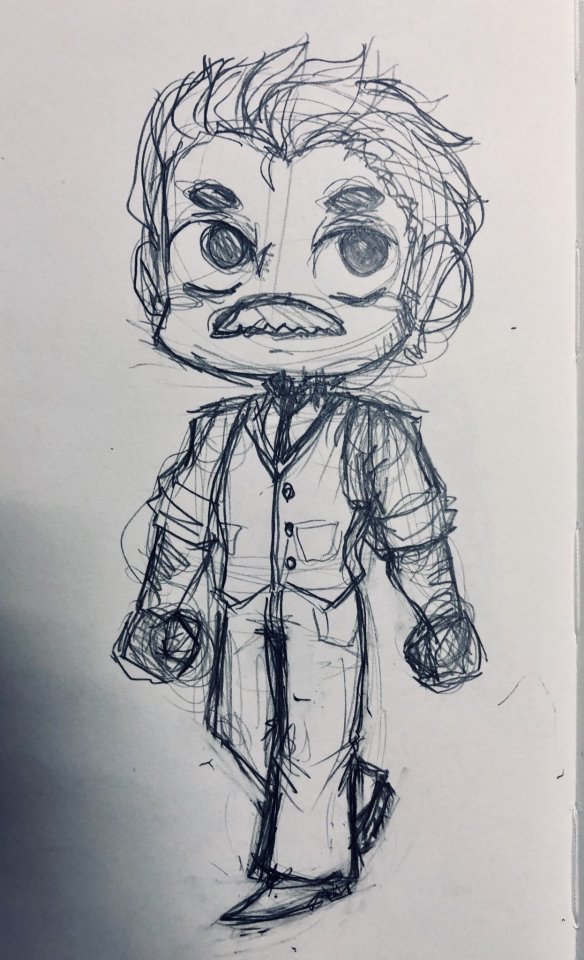
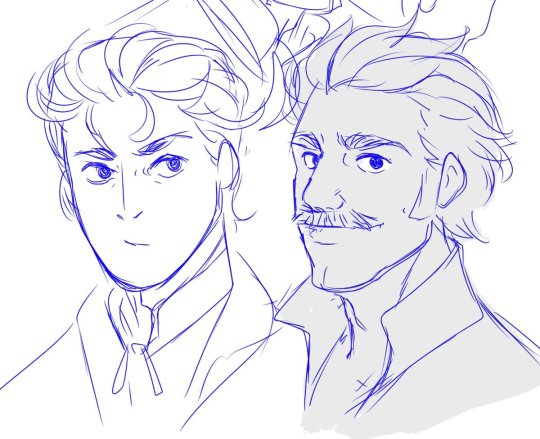
(source: gomooink on twitter)
--
Enola Holmes (Ruler)
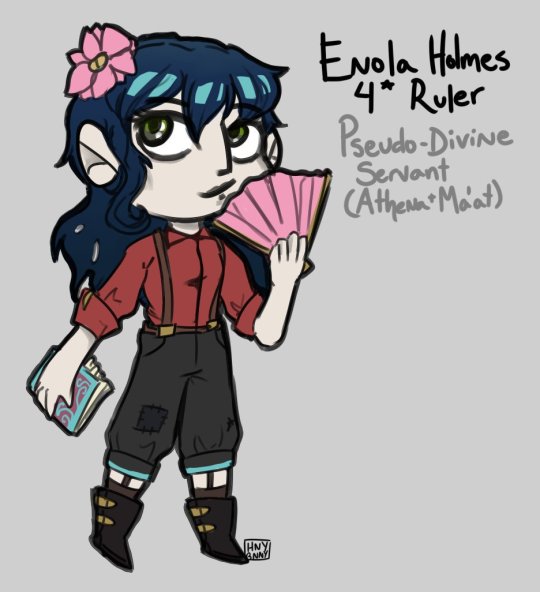
If Sherlock is the representation of all great detectives, then the teenage Enola Holmes is the representation of all female sleuths. Originally far too weak to be a servant- her source material being extremely modern (Enola Holmes series by Nancy Springer), she contains the essence of the great detectives of the fairer sex, but most importantly of two Divine spirits- Athena and Persephone (not Ma’at, despite what the image says-), both Greek goddesses. Athena is the dominant of the two, and a maternal figure to Enola, while Persephone is content just to sit back and enjoy the ride.
The younger sister of Sherlock and Mycroft Holmes (and sometimes, the mysterious elder sibling Sherrinford), Enola is much like her more famous brother- similar in lanky stature and physical features, including the prominent hawk-like nose. She is plain in appearance but behind bright eyes hides an intelligent, clever mind, albeit a stubborn and hard-headed one. She is a rebel at heart, resisting the efforts of society to shove her into the mold of a perfect subservient Victorian woman. Enola often uses being underestimated due to her sex and age to her advantage, and, like Sherlock, is quite adept at the art of disguise. With her Spirit Origin also containing figures like Nancy Drew and Miss Marple, Enola is a talented private investigator with a knack for seeing things from angles that other’s can’t- like that of a woman.
Also yeah, she gay. Keep scrolling. She would like to hold hands with Mash very much.
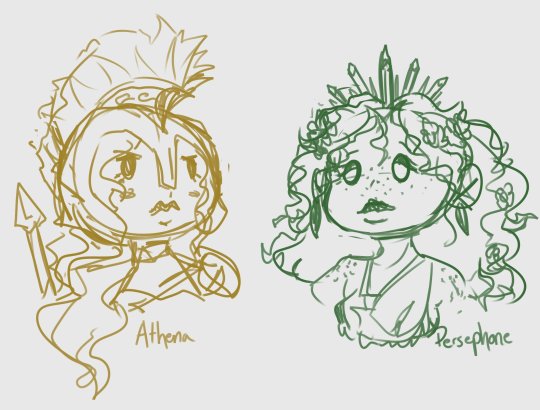

(enola w/ her brother mycroft; source, dewa-chan)
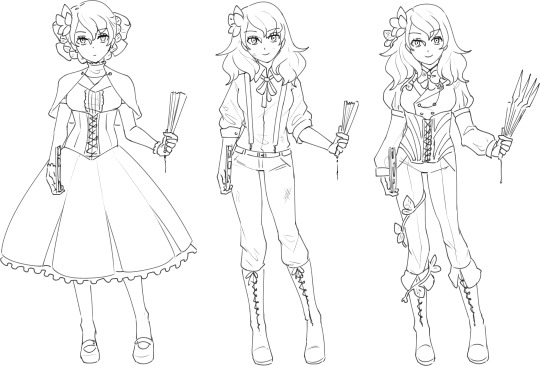
(concepts for her ascensions, mostly cemented, again courtesy of dewa-chan who i owe my life to always and forever-)
--
Columbia (Ruler)
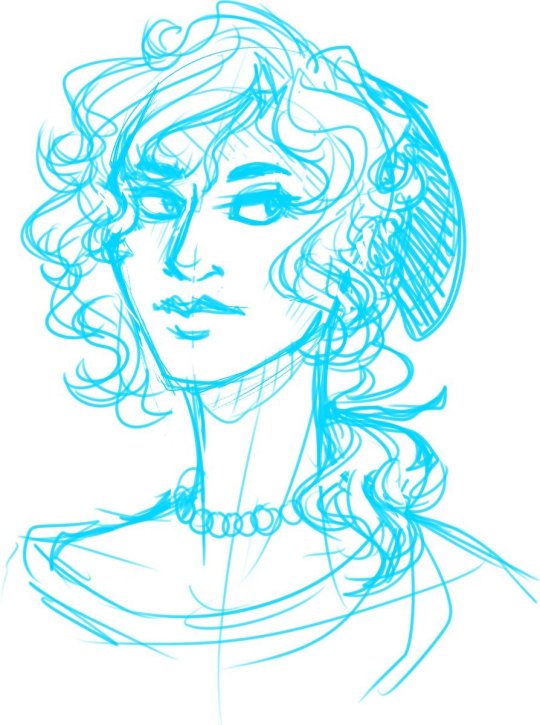
The Divine Servant calling herself Columbia is a complex individual. At face value, she is the personification of the United States of America, often visualized as a goddess; a quasi-mythical figure first written about by the enslaved poet Phillis Wheatley during the Revolutionary War in her work To His Excellency, George Washington. Columbia is, in fact, an amalgamation of two lesser Divine Spirits. One of them is the Roman goddess of liberty, Libertas. The majority of personifications of liberty are merely aspects and appearances of her, including the Statue of Liberty and the unidentified woman in the painting Liberty Leading the People, leading to Libertas having a more powerful- if rather confusing- Spirit Origin compared to most other minor Roman deities. The other is Columbia herself; a goddess first encountered by Chaldea during the odd adventures with Paul Bunyan. She is the symbol of America, and although she is technically a goddess, she is not worshiped- instead existing as an anthropomorphic personification akin to Uncle Sam. She is a goddess crafted by humankind, a manifestation of the thirst for freedom and equality that resides in the heart of man.
However, her existence is still closely intertwined with Libertas, having come from her 'lineage'; Columbia explains that if other personifications of liberty were to manifest, such as Marianne- the French icon of liberty, they would have to have Libertas accompanying their own Spirit Origin to be anything more than a Phantom. Columbia is not only linked to the nation carrying the name America, but to the land itself- in her earliest incarnations she served as a representation of the Americas- both South and North- to those across the Atlantic. She protects all who walk across the great frontier, and all those who have walked it before. Geronimo often voices his hopes that she is the same goddess that brought the first peoples of the yet-unnamed land delicious maize in abundance; Columbia only ever gives a knowing wink, always keeping the answer to herself.
Columbia tries to speak like a newscaster- that is, without an accent- to hide that fact that her true accent as a Servant is the thickest fucking New York brogue you can imagine. AYYYY, SHE’S WALKIN’ ‘EEEEERE!!!!
She has two Noble Phantasms- a support one, her main, called ‘ TORCH OF THE NEW COLOSSUS: THE DREAM OF A NATION ‘, and an offensive albeit rarely used NP called ‘ STRIKE FOR FREEDOM: DO NOT WEEP, FOR WAR IS KIND ‘ that has anti-Country parameters /because it straight up fuckin’ manifests the american military from all across its history-/
Columbia is just... a big country mom. who can grow to the size of the statue of liberty. whoops.
[[LINK TO HER INTRO CHAPTER IN MY FANSERVANT FIC]]
--
Thomas Edison (True) (Caster(?))
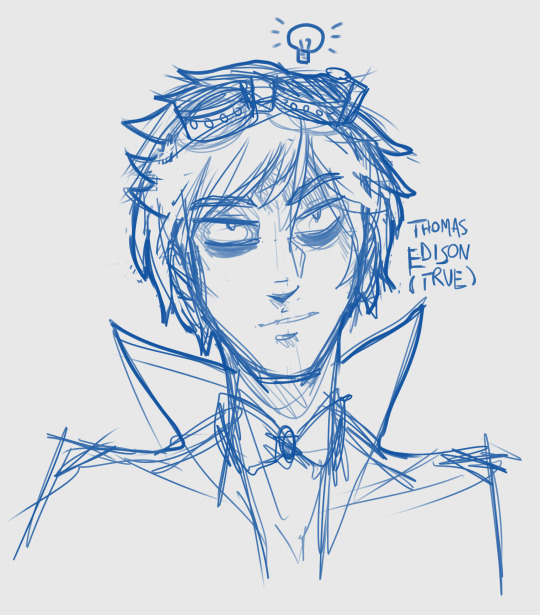
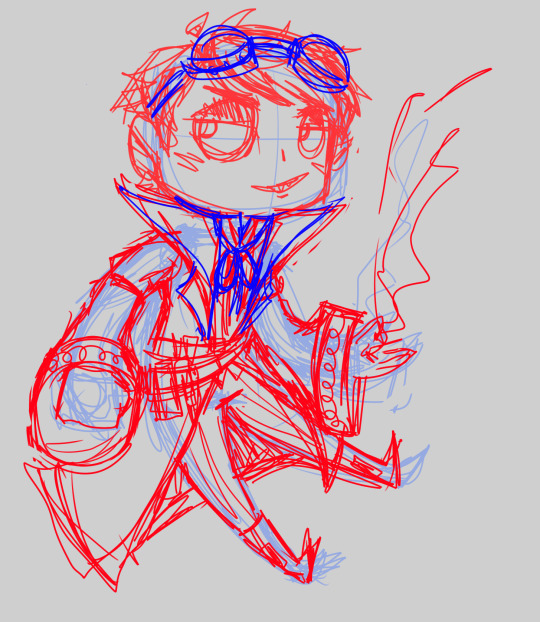
BASTARD MAN. BASTARD. This Thomas Edison, though being initially called an Alter, is actually the True manifestation of the ‘Wizard of Menlo Park’ without the influence of so many presidential heroic spirits. To match Tesla, he’s a 5*. I have him as Caster but... that’s still up in the air, tbh.
He will steal your Noble Phantasm and claim it as his own. It’s actually one of his Skills- ‘Intellectual Copyright’. It blocks an enemy's ability to use their Noble Phantasm, sealing it for a length of time, while also buffing Edison in return- the strength of the buff received is proportionate to the strength of the sealed Noble Phantasm. This embodies Edison's habit of taking other people's ideas for his own, and while he often improved upon them, he still claimed them as solely his creations. He can copy the abilities of others and shape them to his own needs, always at the ready with a lawsuit in hand if anyone dare complain!
He is not allowed around Ivan or Ganesha due to his history with elephants and electrocution.
His Noble Phantasm (he may have more than one, he gets VERY shifty when asked) is a manifestation of his most terrible and deadly creation- the electric chair. He can also create a reality marble of a fantastical Menlo Park, a thriving center of innovation and invention, using his Territory Creation.
Did I mention he’s a bastard? God, he’s a bastard. He’s incredibly intelligent BUT HE IS A BASTARD. He’s Evil alignment (arguably, may be Chaotic Netural-). It pains Tesla to admit that he actually likes normal Edison (furry man) much more.
Ask him what he did to Louie Le Prince and he’ll sock you in the jaw and take off running (and also not answer).
--
Nicolas Flamel (Caster)
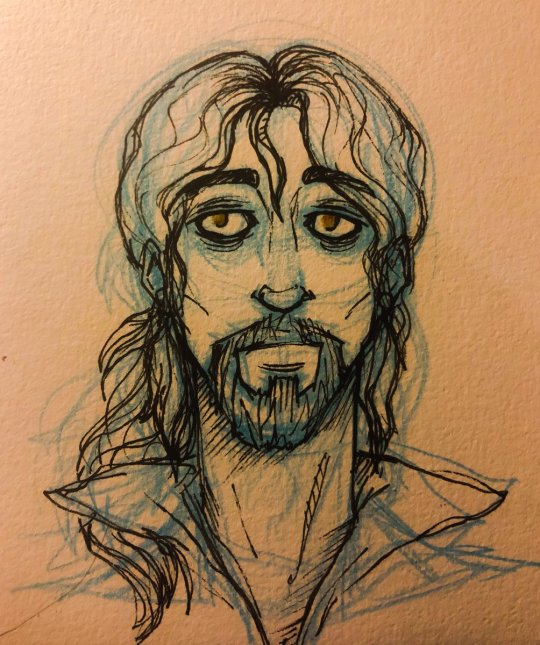
The Alchemist, the great and immortal Nicolas Flamel himself. He’s a sad old lanky Frenchman DILF dad who misses his wife a lot, and is always ready to throw hands with Merlin and/or Paracelsus. He’s a potential candidate for the Grand Caster class, but is behind Solomon and Merlin in ‘line’. Flamel was a successful French scribe who would gain a reputation as an alchemist after his death in 1418- or at least, his presumed death. He was rumored to have been successful in his creation of the Philosopher's Stone, an artifact with the ability to transmute base metals, and with it was able to create a way to achieve immortality. This Stone was his magnum opus, and he was the first to successfully create it- a fact he makes sure that Paracelsus is aware of at all times.
Also, much like Merlin, he’s not a true Servant. This is THE Nicolas Flamel. But... what happened to Perenelle, his wife? He does not like to talk about it.
He enjoys peace and quiet, educated debate, and reading. Flamel gets on quite well with his fellow Frenchman Dantes, as well as with Waver/El Meloi.
THE DRAGONS OF FLAMEL (Skill): Flamel summons a staff of Cadeceus. Carried by the Greek god Hermes in mythology, it is said "...wake the sleeping and send the awake to sleep. If applied to the dying, their death was gentle; if applied to the dead, they returned to life". In the hands of Flamel, it can stun an enemy or counteract the effects of a stun-inducing skill upon an ally. As well as that, it can channel the effects of its corresponding god-named element mercury, able to dissolve many metals like silver and gold at will. However, like mercury, this skill is extremely volatile and prone to backfiring violently on Flamel if overused.
ELIXER OF LIFE (Skill): The ultimate alchemical creation- the solution, part of Flamel's legend, that granted he and his wife immortality. He keeps a small flask of the elixer on him at all times, and can be used in a pinch to heal all of Flamel's physical wounds, or that of a singular ally. However, it is not enough to grant an ally immortality, nor is it enough to heal multiple mortal wounds. The substance takes exactly one week, given the right materials, for Flamel to remake and refill his flask with some of the elixer.
He has two Noble Phantasms, one being ‘The Stone of the Philosphers’, and the other being ‘The Book of Abra-Melin the Mage’.
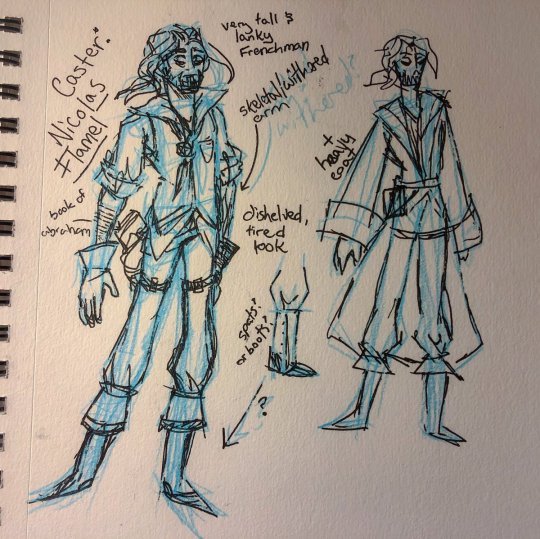
[[LINK TO HIS INTRO CHAPTER IN MY FANSERVANT FIC ALSO THERES A LATER CHAPTER WHERE HE ATTEMPTS TO THROW HANDS W/ PARACELSUS]]
--
Captain Alfred Bulltop Stormalong (Rider)
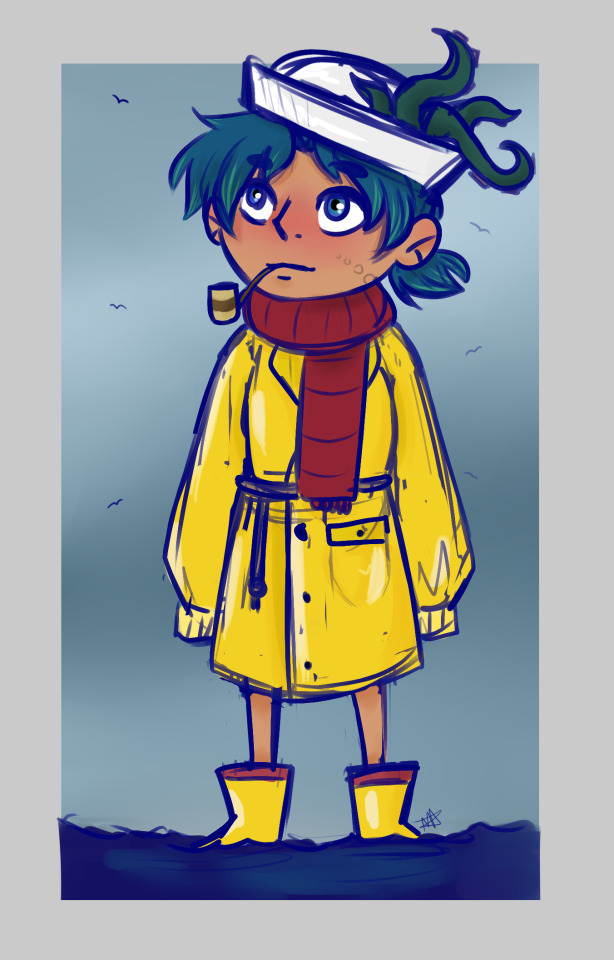
Captain Alfred Bulltop Stormalong is, plainly put, pretty much a nautical version of Paul Bunyan. Like Bunyan, he can change his size at will, growing to huge proportions. His giant ship was said to have hinged masts so as not to catch them on the moon, and had a stable of Arabian horses on board for his crew to get from one end of the ship to the other! Stormalong is said to have had a lifelong rivalry with the fabled Kraken- but unfortunately for the legendary sea beast, it got summoned alongside Stormalong and has begrudgingly taken up residence in his hat in a somewhat smaller form.

His main weapon (not drawn) is a ship's anchor he wields like a flail. His pipe is really just for the aesthetic as he can't use it to smoke, but it does blow bubbles! His Noble Phantasm is The Courser and the Kraken (Massive all-enemy damage + stun).
He’s a good boy who loves boats, the water, and clam chowder.
--
Edgar Allan Poe (Foreigner)
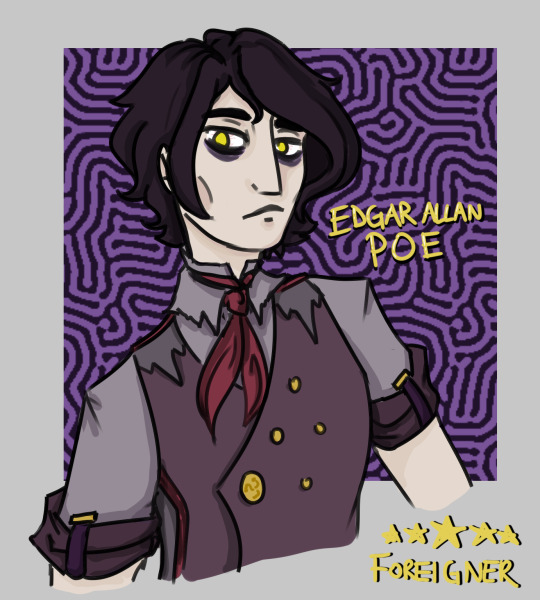
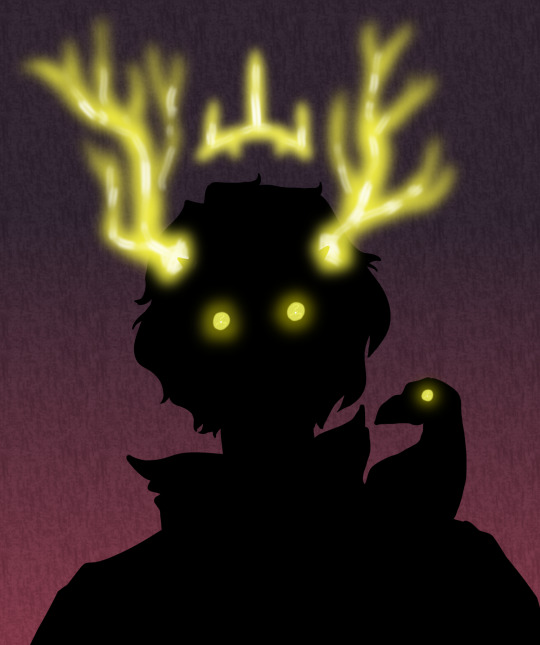
The alcoholic author himself, Edgar Allan Poe is a Foreigner-class servant, being linked with the King in Yellow- Hastur the Unspeakable.
Sometimes you can find him locked in a tiny pitch-black closet with Dantes and Sherlock, all three of them puffing away in utter silence on their tobacco. Hastur most often takes the form of a multi-eyed raven chillin’ on his shoulder, and is capable of speech- if prodded, he will shit-talk the patrons of Poe’s fellow foreigners. He really doesn’t like Cthulhu and Yog, even if Poe has psuedo-adopted Abby, WHOOPS. Hastur, to his credit, is the least malevolent Elder God/patron in Chaldea- though if he is seen chatting with Moriarty by any servants or staff, Master must be alerted immediately.
True to form, he’s very macabre, with a unique dramatic way of speaking much like his writings. He’s unsettling and creepy, but has impeccable manners and likes to chat (he’s very lonely-). He enjoys a good mystery, and is prepared to find Arthur Conan Doyle if he be a heroic spirit and beating the snot out of him for treating Holmes so poorly- Poe was the inventor of the detective fiction genre, after all. Most of skills manifest visually as references to his most famous works. His NP is ‘ A DREAM WITHIN A DREAM : THE CRY OF THE YELLOW RAVEN, NEVERMORE ‘
He doesn’t know what a ‘Hot Topic’ is, but it sounds intriguing!
And no, he doesn’t know what the hell was up with his death either. Weird shit happens in Boston.
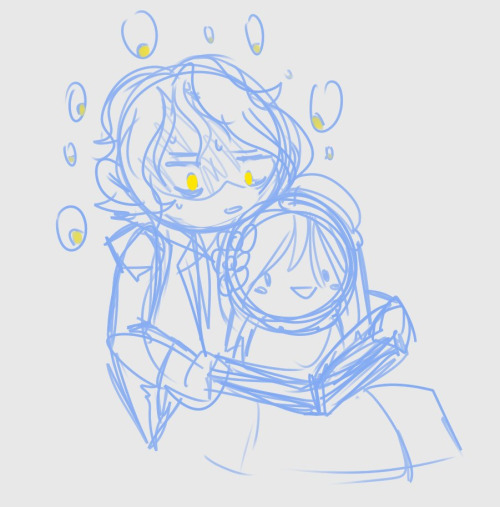

#sebastian moran | assassin#john watson | caster#fgo oc#fanservant#fate grand order oc#enola holmes | ruler#captain stormalong | rider#nicolas flamel | caster#columbia | ruler#thomas edison | caster (true)#edgar allan poe | foreigner#servant#fate grand order
71 notes
·
View notes
Text
Max Minghella On 'The Handmaid's Tale,' His Dad, Romance, & 'Spiral'
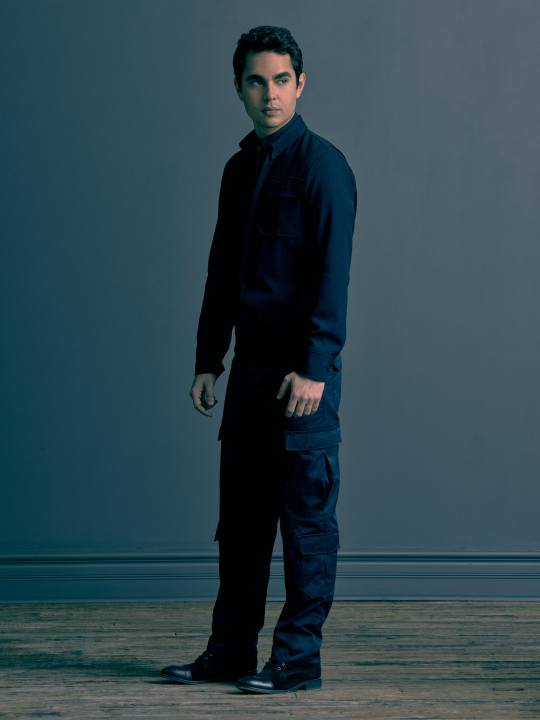
Max Minghella is sitting in his backyard in the LA sunshine, his t-shirt an homage to the French filmmaker Mia Hansen-Løve, his adopted shepherd mix, Rhye, excited by the approach of a package courier.
“You okay, sweetheart?” he asks — the dog, not me — tenderly.
Minghella, who at 35 has dozens of screen credits to his name, is best known as The Handmaid’s Tale’s cunning chauffeur Nick Blaine, a character who it’s difficult to imagine saying sweetheart. In airless Gilead, of course, a cautious hand graze with Elisabeth Moss’ June can pass for a big romantic gesture. In a Season 1 episode featuring child separation and hospital infant abduction, Nick’s major contribution is to trade stolen glances with a sex slave while “Don’t You (Forget About Me)” pumps discordantly along. I ask Minghella about playing the series’ closest approximation to a dreamy male lead against the show’s dark narrative of female subjugation.
“I know this is not the answer you want to hear,” Minghella says with none of Nick’s hesitation. “But I like that stuff, right? In the pilot, I think Nick only had a handful of lines. It wasn't clear that this is what the character would turn into. And it's quite fortunate for me personally, because I'm not a massively sort of intellectual person in my real life. I love Fifty Shades of Grey. That's like my Star Wars. It suits me to play a character like him.”
Minghella surmises that this enduring romanticism is an outcome of nurture. His father, the late British director Anthony Minghella, made grand romantic dramas like Cold Mountain and The English Patient. And there was the young, cinema-mad Max sitting on the living room sofa, absorbing everything. “It’s taken me a long time to understand this,” he says of his prolonged childhood exposure to love stories. “My dad made The English Patient when I was 10. So it was two years of watching the dailies to that movie and then watching 50 cuts of it. And then [The Talented Mr.] Ripley he made when I was 13, and it was the same thing.” These were an adolescent Max Minghella’s alternative to reruns. “I think they did shape my perspective on the world in a lot of ways, specifically The English Patient. That was a complicated love story, and I wonder sometimes how much it's affected my psychology.”
Some sons rebel; others resemble. Minghella’s co-star O-T Fagbenle, who plays June’s other lover from before the time of Gilead, got his first job acting in Anthony Minghella’s romantic crime film Breaking and Entering. “Anthony is one the kindest, most beautiful men that I've ever had the privilege of working with before,” Fagbenle says. “And Max has his gorgeous, sensitive, open-minded soul.”
Though Minghella spent his childhood on the set of The Talented Mr. Ripley, playing an uncredited Confederate soldier role in Cold Mountain, and tooling around with a Super-8 camera Matt Damon gave him, he insists his upbringing was normal. He grew up in South Hill Park overlooking Hampstead Heath in London with his father and mother, the choreographer Carolyn Choa. (Minghella also has a half-sister, Hannah Minghella, who is now a film executive.) Yes, technically, it was London, but that’s not how it seemed. “I feel like I grew up in a very small town. Every school I went to was in Hampstead. I was born in Hampstead,” Minghella says of the small map dot of his life before university. “When I went to New York, I felt I was going to the big city.”
Despite his illustrious surname, movie-watching was far from restricted to the classics. “Beverly Hills Cop is definitely the movie I remember having an unhealthy obsession with. I think I saw it when I was 5 for the first time, and I'd watch it just two or three times a day for years. I'm just obsessed with it.”
Plenty of actors can trace their love of movies back to a love of stories, but for Minghella the relationship seems to flow in reverse. When he left for Columbia University, Minghella opted to study history for its connection, through storytelling, to film. It was during the summers between his years of college that he started taking acting more seriously. Before his graduation, he’d already appeared in Syriana, starring Damon and George Clooney. Soon, he’d make a splash as Divya Narendra in The Social Network in 2010 and be cast in Clooney’s Ides of March. As all young actors eventually must, Minghella moved to Los Angeles.
It’s been over a decade since he last lived on the Heath, but, perhaps unusually for a person who’s chosen his profession, Minghella is adamantly not a “shapeshifter,” in his words. Home for Christmas this year, he started sifting through old journals stored at his mother’s house, “just like scraps of writing from when I was extremely young up through my teenage years,” before coming to America. “It was hilarious to me,” Minghella says of staring at his childhood reflection. “My review of a movie at 7 years old is pretty much what my review of a movie at 35 will be. My taste hasn't changed much. And when I sort of love something, I do tend to continue to love it.”
Which brings us back to his enduring love of romance, born of his bloodline, which is all over Minghella’s own 2018 directorial debut. Teen Spirit is a hazily lit film about a teenage girl from the Isle of Wight — the remote British island where Max’s father Anthony was born — who enters a local X-Factor-style singing competition. (It stars Minghella’s rumored girlfriend of several years, Elle Fanning.) The story is small, but its crescendos are epic.
Minghella calls the movie — an ode to the power of the pop anthem — “embarrassingly Max.” Max loves a good music-driven movie trailer — he’s watched the one for Top Gun: Maverick “many” times. And Max loves the rhythmic beats of sports movies like Friday Night Lights. Max loves movies with excesses of female energy, like Spring Breakers. He likens Teen Spirit to an experiment, his answer to the question, “Can I take all these things that I love and find a structure that can hold them?” The result is a touching “hodgepodge” of Minghella’s fascinations, inspired by the songs from another thing he loves: Robyn’s 2010 album Body Talk (itself a dance-pop meditation on love).
Minghella hasn’t directed any films since, but he sees now how making movies fits his personality — organized, impatient — more organically than starring in them does. Directing also helped him to appreciate that acting is “much harder than I was giving it credit for,” which, in turn, has made him like it more. Besides The Handmaid’s Tale currently airing on Hulu, Minghella appears in Spiral, the ninth installment in the Saw horror franchise and, from where I’m sitting, at least, a departure.
“I do like horror movies, but the thing that was really kind of magical is that I was feeling so nostalgic, right? We talked about Beverly Hills Cop earlier. I was just missing a certain kind of movie,” Minghella explains of his new role as Chris Rock’s detective partner. He was yearning for simple story-telling, like in the buddy cop movies of his youth, especially 48 Hours. It almost goes without saying that a buddy cop movie is another kind of love story. “And then I read the script and it was very much in that vein.” He clarifies: “I mean, it's also extremely Saw. It's very much a horror movie.”
His renewed excitement for acting translated onto The Handmaid’s Tale set, too. Veteran Hollywood producer Warren Littlefield describes casting Minghella in the role of Nick as an effortless choice: “Sometimes you agonize over things. [Casting Minghella] was instantly clear to me, and everyone agreed.” Now in its fourth season, the tone of the Hulu hit is graver than ever. Gilead is more desperate to maintain its rule, and so more audacious in its violence. Perhaps it’s fitting that the show’s romantic gestures finally match that scale.
In one particularly soaring moment, Elisabeth Moss’ June and Minghella’s Nick meet at the center of a bridge and crush into a long kiss. It’s been two seasons since they held their newborn daughter together, and it’s hard to see how this isn’t their last goodbye. Littlefield, like Minghella, is here for the romance among the rubble. “It's spectacular when they come together. In the middle of all of the trauma is this epic love story,” he says. “Max is just magnificent in the role.”
For Minghella, the satisfaction is more personal. He works with good people, he likes his scenes, and he thinks Nick is a complex character. Minghella read The Handmaid’s Tale for the first time in college in 2005. Like all the things Minghella has ever liked, he still likes it. He’s as proud of this most recent season as he is the show’s first. And he watched Nick and June race recklessly back to each other across the expanse of the screen exactly how you might expect. “I watched it like a fan girl.”
Get Relationship Advice Here
3 notes
·
View notes
Text
Stop the arguments. Read a dictionary. Read the bible. (A letter to Republicans.)
Everyone else may as well pass over, because you already agree. Please do send this post to any Republicans or Trump Trolls you know or come across, because I put everything I could in here all in one letter.
Republican? Trump supporter?
So you think poor people are ‘takers’ or ‘leeches’.
To accept help or a gift is called ‘recieving’. As your business recieves money in exchange for goods and services. Sometimes, when you sell something, people give you money for other reasons than wanting your product, especially if you are in the entertainment business. They gave you the money...Did you leech or take it?
You think people should all work for themselves.
Do you really work? Did someone help you get where you are? Do you just sit around and extort money from people by owning their basic needs and charging ridiculous prices for it? Maybe your parents gave you a job, gave you free advice and education, gave you money? Not everyone had parents or money or access to education to begin with. It doesn’t make them lazy.
You think everyone should be independent.
I have heard that a Republican value is ‘less taxes’, ‘don’t touch what I earned’.
Why do all Republican politicians want to either raise taxes, or redistribute taxes into the military? What are we protecting so fiercely? A country where the sick, old, non-white, unmarried women, and born-poor can die on the street alone while rich cis-het white men spit on them? A country where veterans starve to death after returning from war? A country where teenagers are murdered at school for holding hands with someone of the same sex or wearing whatever non-offensive clothing they want? A country where men still regularly get away with rape scott free? A country where women are harassed and put down and verbally abused and told that their proper place is as someone’s sandwich and baby making machine?
Do you think you are ever really independent? You run a business....You depend on people buying your goods and services.
All of these people could be consumers. If you own apartments, low income housing brings your tax money back to you and supports them. If you own a grocery store, food stamps gives your tax money back to you and supports them. If you own hospitals, medicaid pays all of their expenses and supports them. If you’re in entertainment, welfare probably comes back to you and enriches their lives. You own hotels or travel companies? Those traveling business owners and workers have companies that are partially supported by these government programs. If you own a factory which produces any kind of goods... guess what? That cycle still applies to you.
The only people our next president wants to give back to are oil companies and weapon makers...one of which will be very likely become obsolete within my lifetime. He wants to make America suffer the Great Depression again. The cabinet is full of sick people who just want everyone to be like them, do what they say, and die otherwise.
Everyone has a right to life and fair treatment. You don’t like helping other people? I say tough shit. It’s the way it ought to be. Think any differently, and you have murderous ideals.
Families are ok taking care of sick blood relatives. Couples are ok taking care of a person they selected to commit to. Why should we not treat all disabled people like our grandfathers, brothers or sisters? What is wrong with our taxes supporting them? There is more than enough to go around.
Republicans are mostly bible thumping Christians....so...
READ THE BIBLE.
“Look at the flowers of the field- they neither till nor toil, yet every one of their needs is taken care of.” - Jesus Christ
He was saying that this is how God is. God takes care of everyone and provides for their needs.
“Love one another, as I have loved you.” - Jesus Christ
He was saying that to do as he has done, to provide for the poor and heal for the sick without asking anything in return, is the way into heaven. Their color, name they call God, and sexual recreational activities matter not. He didn’t say “except the poor, black, female, gay ,and muslim.”
Can you point out where it says in the bible “FUCK HELPING PEOPLE. Be selfish, keep what you’ve got and kick starving poor people off your huge ass lawn cause you don’t like looking at the color of their skin.”
If Jesus is the lord, why do you selectively listen to all the really terrible shit other people in the bible claim that they heard God say to them? Surely, if anyone burns in hell, it’ll be you, not the gay couple down the street.
Stop using the bible to defend your hatred and violent sadistic nature.
Lastly, I want to address the holier-than-though “I’m so logical’ type of Republican.
You think everyone owning guns will stop violent crime? If guns were easier to get, this would only INCREASE the ease of access to really fucked up people, dumbass. More people owning guns means more chances for bad people to steal those guns or to acquire those guns.
Democrats don’t necessarily want to send us back to all fighting with swords...they want guns kept inaccessible to civilians so only police and military can use them to protect us. Tell me one other place in the world where all people having access to guns has made for a more peaceful and safe society. You’re just an neurotic, obsessed gun nut who doesn’t feel confident enough in fighting off attackers with his fists.
As for the welfare crap...Welfare isn't taking anything away from anyone who needs it. That’s the whole point! It gives to people who need it. What the crap are you crying about? HOW THE HELL IS WELFARE DESTROYING OUR ECONOMY??? YOU’LL HAVE ONE LESS MOVIE TICKET PER YEAR SO A POOR FAMILY CAN HAVE FOOD? OH, SOB. YOU HAVE NO RIGHT TO COMPLAIN ABOUT PAYING TAXES. TAXES ARE FAIR AND WELFARE TRIES TO MAKE SURE EVERYONE HAS ENOUGH TO LIVE. If you have no issue with giving your tax money to building more totally unnecessary rockets and bombs, but you do have an issue with it feeding a ‘gross family of disgusting lower class colored people’ or ‘providing health care for some loathesome sodomite’ or protecting the planet which you live on and depend upon, Then you are fucked up, & downright stupid.
I love that we have taxes that take care of people. I love that the government does this. I love that there are doctors, nurses, psychologists, Christlike pastors, elder caretakers, food and clothes closets, Planned Parenthood, LGBT centers, people who dedicate their lives to helping others. I love this because it makes my work easier. It makes my life easier. I don’t to take time to help individual people constantly, and with more toward the right things it would leave less panhandlers on the street, less odor of people who are mentally handicapped and have no place to bathe, less sad sights of violent hate crimes...more educated people all over the country, more happy people. More people with money to spend, and therefore more beautiful variety and diversity in art, music, fashion, and even food. I would have been so happy if Bernie Sanders had become president and increased the tax percentage, taking away one small luxury from those who have them. And I will happily pay my taxes and donate money to charities should I ever become a billionaire. Fuck Trump, I look up to REAL successful businessmen like Bill Gates...Mark Zuckerburg (who even though I thing said some very twatty things, has given millions away to San Francisco’s only low-income hospital and pledged 99% of his stock to be given towards scientific advancements of humanity), and Michael Bloomberg (Who gave millions to help wean people off of coal energy.) Guys who didn’t go bankrupt 6 times and have recognizable names to pretty much everyone in the world before 2016, and actually paid their taxes.
I am far from a billionaire, in fact, I am below poverty level. I still donate 1% of my yearly income to people even less fortunate than me. Whatever I can spare.
If you are a Christian, you should have heard about tithing.
This is the deplorable sack of shit you voted for:
http://www.weeklystandard.com/for-years-trumps-charity-gave-veterans-little-more-than-peanuts/article/2000776
#democrattorepublican#politics#socialist#socialism#republican#trump#republicans#makeamericagreatagain#berner#feelthebern#america#2016election#usadivided#political#economics#economy#weareone#united states#weareconnected#lesson#thisishowlifeworks#jesus#jesusislove#godislove#christian#christianity#bible#readthebible#belikechrist#whatwouldjesusdo
1 note
·
View note
Text
Max Minghella On 'The Handmaid's Tale,' His Dad, Romance, & 'Spiral'

Max Minghella is sitting in his backyard in the LA sunshine, his t-shirt an homage to the French filmmaker Mia Hansen-Løve, his adopted shepherd mix, Rhye, excited by the approach of a package courier.
“You okay, sweetheart?” he asks — the dog, not me — tenderly.
Minghella, who at 35 has dozens of screen credits to his name, is best known as The Handmaid’s Tale’s cunning chauffeur Nick Blaine, a character who it’s difficult to imagine saying sweetheart. In airless Gilead, of course, a cautious hand graze with Elisabeth Moss’ June can pass for a big romantic gesture. In a Season 1 episode featuring child separation and hospital infant abduction, Nick’s major contribution is to trade stolen glances with a sex slave while “Don’t You (Forget About Me)” pumps discordantly along. I ask Minghella about playing the series’ closest approximation to a dreamy male lead against the show’s dark narrative of female subjugation.
“I know this is not the answer you want to hear,” Minghella says with none of Nick’s hesitation. “But I like that stuff, right? In the pilot, I think Nick only had a handful of lines. It wasn't clear that this is what the character would turn into. And it's quite fortunate for me personally, because I'm not a massively sort of intellectual person in my real life. I love Fifty Shades of Grey. That's like my Star Wars. It suits me to play a character like him.”
Minghella surmises that this enduring romanticism is an outcome of nurture. His father, the late British director Anthony Minghella, made grand romantic dramas like Cold Mountain and The English Patient. And there was the young, cinema-mad Max sitting on the living room sofa, absorbing everything. “It’s taken me a long time to understand this,” he says of his prolonged childhood exposure to love stories. “My dad made The English Patient when I was 10. So it was two years of watching the dailies to that movie and then watching 50 cuts of it. And then [The Talented Mr.] Ripley he made when I was 13, and it was the same thing.” These were an adolescent Max Minghella’s alternative to reruns. “I think they did shape my perspective on the world in a lot of ways, specifically The English Patient. That was a complicated love story, and I wonder sometimes how much it's affected my psychology.”
Some sons rebel; others resemble. Minghella’s co-star O-T Fagbenle, who plays June’s other lover from before the time of Gilead, got his first job acting in Anthony Minghella’s romantic crime film Breaking and Entering. “Anthony is one the kindest, most beautiful men that I've ever had the privilege of working with before,” Fagbenle says. “And Max has his gorgeous, sensitive, open-minded soul.”
Though Minghella spent his childhood on the set of The Talented Mr. Ripley, playing an uncredited Confederate soldier role in Cold Mountain, and tooling around with a Super-8 camera Matt Damon gave him, he insists his upbringing was normal. He grew up in South Hill Park overlooking Hampstead Heath in London with his father and mother, the choreographer Carolyn Choa. (Minghella also has a half-sister, Hannah Minghella, who is now a film executive.) Yes, technically, it was London, but that’s not how it seemed. “I feel like I grew up in a very small town. Every school I went to was in Hampstead. I was born in Hampstead,” Minghella says of the small map dot of his life before university. “When I went to New York, I felt I was going to the big city.”
Despite his illustrious surname, movie-watching was far from restricted to the classics. “Beverly Hills Cop is definitely the movie I remember having an unhealthy obsession with. I think I saw it when I was 5 for the first time, and I'd watch it just two or three times a day for years. I'm just obsessed with it.”
Plenty of actors can trace their love of movies back to a love of stories, but for Minghella the relationship seems to flow in reverse. When he left for Columbia University, Minghella opted to study history for its connection, through storytelling, to film. It was during the summers between his years of college that he started taking acting more seriously. Before his graduation, he’d already appeared in Syriana, starring Damon and George Clooney. Soon, he’d make a splash as Divya Narendra in The Social Network in 2010 and be cast in Clooney’s Ides of March. As all young actors eventually must, Minghella moved to Los Angeles.
It’s been over a decade since he last lived on the Heath, but, perhaps unusually for a person who’s chosen his profession, Minghella is adamantly not a “shapeshifter,” in his words. Home for Christmas this year, he started sifting through old journals stored at his mother’s house, “just like scraps of writing from when I was extremely young up through my teenage years,” before coming to America. “It was hilarious to me,” Minghella says of staring at his childhood reflection. “My review of a movie at 7 years old is pretty much what my review of a movie at 35 will be. My taste hasn't changed much. And when I sort of love something, I do tend to continue to love it.”
Which brings us back to his enduring love of romance, born of his bloodline, which is all over Minghella’s own 2018 directorial debut. Teen Spirit is a hazily lit film about a teenage girl from the Isle of Wight — the remote British island where Max’s father Anthony was born — who enters a local X-Factor-style singing competition. (It stars Minghella’s rumored girlfriend of several years, Elle Fanning.) The story is small, but its crescendos are epic.
Minghella calls the movie — an ode to the power of the pop anthem — “embarrassingly Max.” Max loves a good music-driven movie trailer — he’s watched the one for Top Gun: Maverick “many” times. And Max loves the rhythmic beats of sports movies like Friday Night Lights. Max loves movies with excesses of female energy, like Spring Breakers. He likens Teen Spirit to an experiment, his answer to the question, “Can I take all these things that I love and find a structure that can hold them?” The result is a touching “hodgepodge” of Minghella’s fascinations, inspired by the songs from another thing he loves: Robyn’s 2010 album Body Talk (itself a dance-pop meditation on love).
Minghella hasn’t directed any films since, but he sees now how making movies fits his personality — organized, impatient — more organically than starring in them does. Directing also helped him to appreciate that acting is “much harder than I was giving it credit for,” which, in turn, has made him like it more. Besides The Handmaid’s Tale currently airing on Hulu, Minghella appears in Spiral, the ninth installment in the Saw horror franchise and, from where I’m sitting, at least, a departure.
“I do like horror movies, but the thing that was really kind of magical is that I was feeling so nostalgic, right? We talked about Beverly Hills Cop earlier. I was just missing a certain kind of movie,” Minghella explains of his new role as Chris Rock’s detective partner. He was yearning for simple story-telling, like in the buddy cop movies of his youth, especially 48 Hours. It almost goes without saying that a buddy cop movie is another kind of love story. “And then I read the script and it was very much in that vein.” He clarifies: “I mean, it's also extremely Saw. It's very much a horror movie.”
His renewed excitement for acting translated onto The Handmaid’s Tale set, too. Veteran Hollywood producer Warren Littlefield describes casting Minghella in the role of Nick as an effortless choice: “Sometimes you agonize over things. [Casting Minghella] was instantly clear to me, and everyone agreed.” Now in its fourth season, the tone of the Hulu hit is graver than ever. Gilead is more desperate to maintain its rule, and so more audacious in its violence. Perhaps it’s fitting that the show’s romantic gestures finally match that scale.
In one particularly soaring moment, Elisabeth Moss’ June and Minghella’s Nick meet at the center of a bridge and crush into a long kiss. It’s been two seasons since they held their newborn daughter together, and it’s hard to see how this isn’t their last goodbye. Littlefield, like Minghella, is here for the romance among the rubble. “It's spectacular when they come together. In the middle of all of the trauma is this epic love story,” he says. “Max is just magnificent in the role.”
For Minghella, the satisfaction is more personal. He works with good people, he likes his scenes, and he thinks Nick is a complex character. Minghella read The Handmaid’s Tale for the first time in college in 2005. Like all the things Minghella has ever liked, he still likes it. He’s as proud of this most recent season as he is the show’s first. And he watched Nick and June race recklessly back to each other across the expanse of the screen exactly how you might expect. “I watched it like a fan girl.”
Get More Dating Advice Here
0 notes